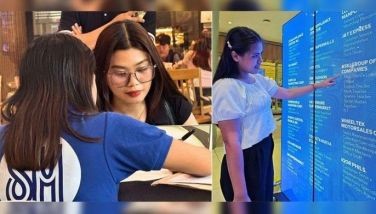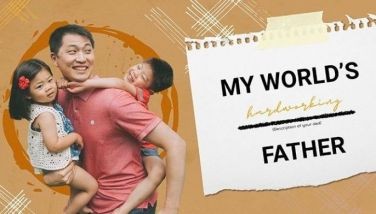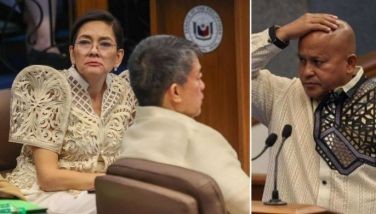Chasing the Filipino dream
MANILA, Philippines - In a sense, Leslie Espinosa was living the American dream. As a hairstylist and makeup artist for film and theater, her job took her from San Diego to Los Angeles, and finally to New York City, where she worked on popular Broadway shows.
Nevertheless, the death of her father following a long battle with cancer shook Leslie’s world, leaving her with a large void in her life that she somehow needed to fill.
“I didn’t know what it was, but all I knew was that I needed to go to the Philippines,” she explained.
Born and raised in America to Filipino parents, Leslie knew in her heart that she needed to get reconnected to her Asian roots.
Leslie decided to take up a volunteer teaching program in the Philippines and ended up exchanging New York City for Quezon City or, to be more precise, a public school in the district of Balintawak: “The area itself was dirty, smelly, dark and unsafe. I was soon hospitalized because of dengue fever, but even then I did not want to leave this country, because I was here to discover myself.”
Leslie’s sense of vocation was aroused by the immense poverty that she had encountered since she arrived, with a growing conviction that she needed to do something about it. She visited the Gawad Kalinga Enchanted Farm, a hub for local and international social entrepreneurs who have committed themselves to creating wealth in a way that leaves no one behind. “This was the place I needed to be, because I sensed I could make a real impact here.”
Now, less than a year later, Leslie calls the Enchanted Farm home and is one of the co-founders of SEED Philippines – the School for Experiential and Entrepreneurial Development – a countryside college for social entrepreneurs.
The first in the Philippines, it opened its doors last month to 45 students from various public schools in Bulacan. Leslie is one of three young foreign ladies – Vicki Cabrera, a fellow Filipino-American, and Laurence Defontaines, from France, being the others – who have decided against returning home in order to set up the school. It aims to provide quality, practical education for those with the least opportunity, mostly children of subsistence farmers. They have established the school under the watchful gaze of Gawad Kalinga founder Tony Meloto.
GK is a nationwide movement that draws together all sections of society to work together, in enterprising ways, with the aim of ending poverty by the year 2024.
Wasted potential
The combination of a fast-growing economy and a high proportion of young people in the population (one of the highest in south-east Asia) ought to offer considerable economic advantages to the Philippines. Sadly, however, because just 14 students get a college degree out of every 100 who enter Grade 1, vast amounts of the nation’s human potential is unfulfilled.
SEED therefore aims to address the resultant skills shortage by opening up a practical and experiential rural-based education for those who would otherwise be deprived of one.
Established in close partnership with TESDA, CHED and the Department of Education, students will have a space to apply the skills and knowledge they learn in the classroom in learning and assisting from the different social enterprises which have been incubated at the farm.
SEED is the first school for social entrepreneurs in Asia, part of a broader objective to grow a new breed of Filipinos who, in the words of Meloto, become wealth creators and job generators at home, not job seekers abroad: “Our target is to train 20,000 social entrepreneurs and innovators in the province of Bulacan alone within the next ten years. SEED will begin here at the Enchanted Farm, but once we have proven that it can work, we want to roll out similar agri-entrepreneurial schools throughout the country.
“Through countryside development, we want to bring back life and productivity to the land which will create opportunities for the poorest and the hungriest of society – our farmers and their children – and mitigate urban migration and congestion. Through social entrepreneurship, we want to create wealth where no one is left behind.”
‘Farming is sexy’
Farming is at present one of the most poorly rewarded professions. Little wonder, then, that very few young people today dream of becoming a farmer, and that the average age of the Filipino farmer is 57 years.
“I come from a family of farmers. My parents work all day long in the fields, but they could never earn enough to send me to college,” one of the SEED scholars, Ron, explained.
Even for the minority who are fortunate enough to afford a decent education, they will most probably head to urban areas where the majority of the country’s best colleges are located.
Ron, however, sees himself as one of a new breed of Filipino who want farming no longer to be seen as the “dirty” profession of the past.
“We need farmers three times a day to eat, but how often do we need a doctor? Maybe once or twice a year! And a lawyer? Well, hopefully by being law-abiding we will never need one of them in our life-time! So that’s why I want to become a farmer and an entrepreneur, because farming feeds the world. Yes, farming can be sexy and profitable,” he said.
‘Welcome to the Enchanted Farm’
SEED students will experience a holistic approach in their education, with a combination of classroom instruction, hands-on learning and character building so that they can develop into future social entrepreneurs and innovators.
“Instead of becoming laborers or tricycle drivers, these students will one day become business owners and employers themselves whether in agriculture, food processing, culinary arts, or hospitality and tourism,” Meloto said.
With hundreds of foreign students from some of Europe’s most prestigious universities spending time at the farm each year (many of them spending several months), students are given the opportunity to take weekly French and English classes.
“We place a lot of emphasis on languages not just for the practical benefits, but because it gives our students such a confidence boost to realize that they can hold their own alongside anyone in society,” Meloto added. “Imagine the look on the faces of some of our best educated and privileged visitors when they are greeted by the kids here who speak English and French.”
Social business summit
As for Leslie, she may have left the US dream behind, but today she seems content in chasing the Filipino dream instead.
“In just a few weeks of classes I have already seen such unbelievable change. There is so much talent here and it is so exciting to be part of something which is finally giving an opportunity for that talent to shine. I just can’t wait to see where these kids will be in a couple of years!”
She, together with the rest of the SEED team, is just one of the many local and international innovators currently based at the GK Enchanted Farm.
Join her and other young change-makers at the Social Business Summit (Oct. 2-4) and expect your eyes to be opened.
Together with TESDA Secretary Joel Villanueva, CHED Secretary Patricia Licuanan and Education Secretary Armin Luistro, they will talk about social education as a pioneering way to bring innovation and wealth creation to the Philippines, “where no-one is left behind.”
For more information, visit the website: www.socialbusinesssummit.net.
The author is a British journalist who came to the Philippines on a short-term assignment. He has since stayed over two years in the country, volunteering for Gawad Kalinga and other causes. His experiences will be documented in a book, “The Genius of the Poor,” which will also be launched during the summit.
- Latest
- Trending






























